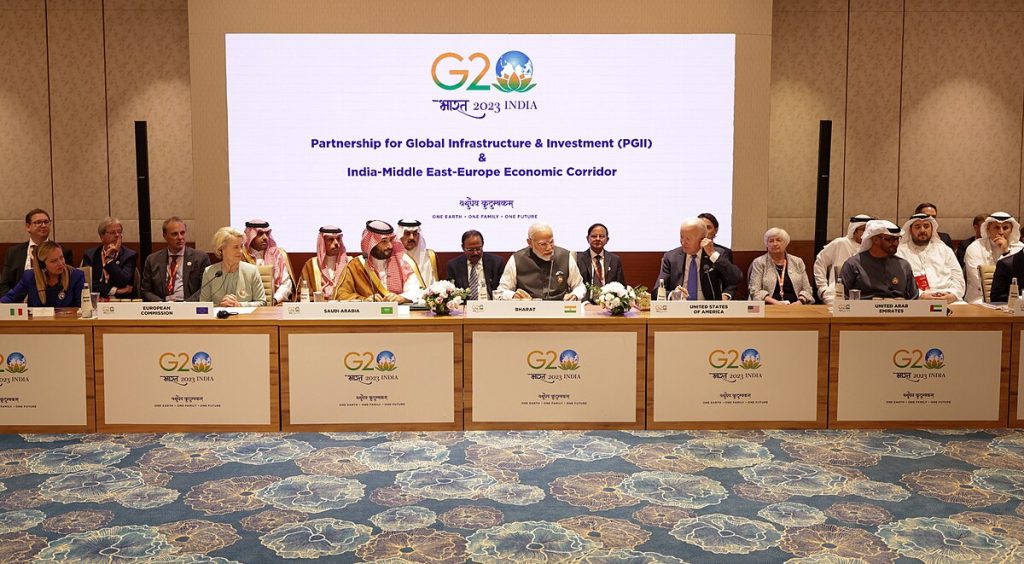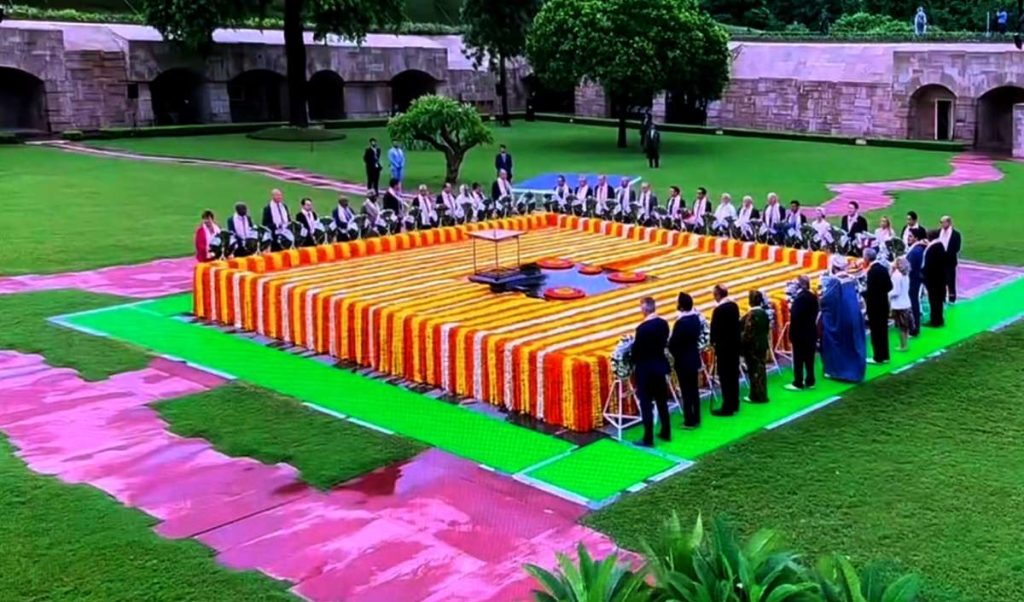
India’s Leadership stands as a testament to global leaders’ concerted efforts to tackle pressing global challenges. With participation from 19 member countries and the European Union, the G-20 summit held at New Delhi was a pivotal platform for global collaborations….writes Dr Arun Kumar
India’s G20 leadership has given a great message for global peace and prosperity with its approach towards One Earth, One Family and One Future. The expanded trajectory of G-20 to G-21 has now 80% of the World population, 88% of the World GDP and 79% of the World trade. Synchronisation of thought process regarding the Global Fuel Alliance, India- Middle East- Europe corridor along with common consensus on crypto currencies would go a long way to build economic resilience and mitigate headwinds of global vulnerabilities.
The G20, or the Group of Twenty (now G21), is an intergovernmental organisation comprising 19 countries, the European Union (EU) and the African Union (AU). Established in 1999 in response to global economic crises, the G20 has since been pivotal in addressing major global economic issues and challenges. The G20 convenes annually, with summits attended by heads of Government or State, Finance Ministers, Foreign Ministers, and other high-ranking officials. This year, it is hosted by India. India’s G20 Presidency theme is “Vasudhaiva Kutumbakam”, or “One Earth · One Family · One Future”, derived from the Maha Upanishad.
Indian Prime Minister Narendra Modi warmly greeted leaders arriving for the G20 Summit held in New Delhi on the 9th and 10th of September 2023 at the Bharat Mandapam venue in Pragati Maidan. The meeting was attended by leaders of 20 member countries and 11 guest countries along with dignitaries from the International Monetary Fund, World Bank Group, UN, WHO, among others. Welcoming the leaders Hon’ble Prime Minister Shri Narendra Modi remarked:
“India’s G20 presidency is coming at a time of crisis and chaos in the world. The world is going through the after-effects of a disruptive once-in-a-century pandemic, conflicts and a lot of economic uncertainty. The symbol of the lotus in the G20 logo is a representation of hope in these times. No matter how adverse the circumstances, the lotus still blooms. Even if the world is in a deep crisis, we can still progress and make the world a better place. In Indian culture, both the Goddess of knowledge and prosperity are seated on a lotus. This is what the world needs most today. Shared knowledge that helps us overcome our circumstances, and shared prosperity that reaches the last person at the last mile”.

Modi hosted 15 bilateral meetings with leaders from various countries, covering a range of topics. The Delhi Declaration adopted on 9th and 10th of September 2023 at the Bharat Mandapam attended by leaders of 20 member countries and 11 guest countries along with regular international organisation has opened the horizons for a greater connectivity of the regions, enhanced size of population, productivity and trade to make the world a better place for living.
The Delhi Declaration, adopted on September 9, 2023, during India’s G20 presidency, presents a unanimous consent of all leaders on critical global priorities. The focus of Delhi declaration on Economic Resilience acknowledges the global economy’s fragility and commits G20 nations to implement prudent monetary, fiscal, financial, and structural policies aimed at fostering growth, reducing inequalities, and preserving macroeconomic stability. Financial Inclusion and Digital Infrastructure formally endorses the G20’s policy recommendations for advancing financial inclusion and productivity gains through Digital Public Infrastructure (DPI). Sustainable Development Commitment acknowledges setbacks in achieving the Sustainable Development Goals (SDGs) and pledges to marshal affordable, accessible financing from diverse sources to bolster sustainable finance for developing countries. Climate Resolve indicates a defining feature of the declaration is its robust commitment to environmental sustainability and the urgent mitigation of climate change.
G20 member nations unanimously agreed to bolster their efforts by fully and effectively implementing the Paris Agreement while respecting the principles of common but differentiated responsibilities (CBDR). The progressive thoughts on Multilateral Development Banks (MDBs) signifies importance of operating models, improving responsiveness, and augmenting financing capabilities to maximize their developmental impact. The great commitment of the G20 nations’ pledge to support women’s empowerment by promoting full, equal, effective, and meaningful participation of women in decision-making processes will create more avenues for a sustainable growth.
India’s G20 presidency focused on key global economic and financial challenges
- Global Trade and Investment related issues: India’s G20 leadership formed a Trade and Investment working group (TIWG) to address global trade and investment challenges.
- Digitalization of Trade Documents: Technology significantly impacts cross-border trade, with paperless systems reducing transaction costs and enabling lower-cost internationalization.
- Trade and Environmental Policies: The leaders agreed that trade and environment policies should be mutually supportive and consistent with global trade rules and multilateral environmental agreements.
- Multilateral Development Banks (MDBs) for Global Challenges: eliminating extreme poverty, boosting shared prosperity, contributing to global public goods, tripling sustainable lending levels by 2030, and creating a third funding mechanism.
- Implementing MDBs Capital Adequacy Frameworks: G20 leaders urge multilateral development banks to leverage private capital and implement recommendations from the G20 Independent Review of MDBs Capital Adequacy Frameworks, potentially generating $200 billion in lending for sustainable development goals and climate finance.
- Domestic Resource Mobilization in Emerging Markets: The G20 pledges to enhance domestic resource mobilization, tax cooperation, and combat illicit financial flows.
- Financial Vulnerabilities and Cyber Risks in the Global Economy : Leaders at G20 stressed that cyberspace has emerged as a new source of funding for terrorism and global cooperation and framework are necessary for securing it.
- Addressing Debt Vulnerabilities: The G20 New Delhi Leaders’ Declaration emphasized addressing debt vulnerabilities in low and middle-income countries, recognizing the Global Sovereign Debt Roundtable’s efforts to improve communication and debt transparency among stakeholders.
- Cross-Border Payments for Global Trade: Leaders pledged to achieve faster, cheaper, transparent, and inclusive cross-border payments by 2027 in the G20 Roadmap for Enhancing Cross-border Payments, considering macro-financial implications.
- Revised Principles of Corporate Governance and Sustainability–G20 Leaders endorsed the revised G20/OECD Principles of Corporate Governance with the aim to strengthen policy and regulatory frameworks for corporate governance that support sustainability and access to finance from capital markets for resilience of the broader economy.
- India Middle East European corridor: A new Indian spice route connecting Asia to Europe to boost the economic integration; a multinational rail and shipping project linking India with Middle East and Europe. The MOU on IMEC was signed by India, USA, Saudi Arabia, UAE, European Union, Italy, France and Germany.
- Global Biofuel Alliance: India leads this initiative, aiming to unite governments, international organizations, and industry players to promote biofuels as a vital element in the global energy transition, creating employment and economic growth.

In a nutshell, India’s Leadership stands as a testament to global leaders’ concerted efforts to tackle pressing global challenges. With participation from 19 member countries and the European Union, the G-20 summit held at New Delhi was a pivotal platform for global collaborations. Prime Minister Narendra Modi’s strategic bilateral meetings covered multifaceted areas such as economic cooperation, technology, and actions on climate change, solidifying partnerships and commitments with enhanced trade, investments and a whopping consumer market. Such strides will go a long way to improve the living standards of people, more and more synchronization of business cycles and a shared peace and prosperity.
The summit’s ultimate achievement is the adoption of Delhi Declaration, a robust commitment to economic resilience, financial inclusion, sustainable development, and climate action. This declaration not only reinforces the global resolve to implement the Paris Agreement but also underscores the unwavering dedication to empowering women across various spheres of society. Furthermore, the summit addresses critical global issues, including conflicts, debt vulnerabilities in low and middle-income countries, and the imperatives for cyber security in today’s interconnected world. India’s leadership in fostering international cooperation for a more inclusive, sustainable, and secure world was on full display at the G20 Summit 2023, making it a pivotal moment in shaping our collective global future.


